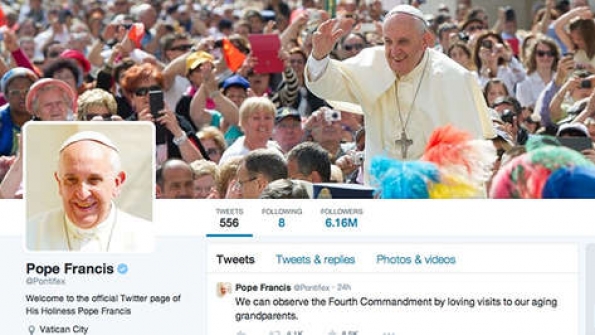Religion, Twitter and freedom. A peaceful explosion.
http://www.economist.com/blogs/erasmus/2015/05/religion-twitter-and-freedom
May 27th 2015, 6:17 BY B.C. | OSLO

APART from the fact that that they all hold, and propagate, strong views about metaphysical matters, what connects the following people? The Dalai Lama; Pope Francis; the Egyptian Muslim preacher Amr Khaled; Joyce Meyer, a charismatic Christian preacher from the American Middle West; Deepak Chopra, best-selling writer on the generically spiritual, and Richard Dawkins, the British atheist intellectual. Answer: they are all stars of the Twitter-sphere; as of this morning, their respective followings were 11.1m, 6.16m, 4.28m, 3.45m, 2.45m and 1.16m.
It probably helps that they use labels, or "Twitter-handles", which consist of the best known versions of their names, apart from the Pope who uses one of his honorific titles, styling himself @pontifex. But if they preferred, they could choose any pseudonym or nickname they wanted. The regime is different on Facebook, where individual account-holders are told to use (at least part of) their legal names and to avoid professional or religious titles; this irks traditional Christian clergy, who cannot call themselves "Father...." or use an ecclesiastical name if it is different from their legal one. As a result, a cleric known to his flock as Father Melchisedek Smith may have to appear on FB as plain old John Smith.
It's not just traditional systems of belief and non-belief that raise their voices on Twitter. Any proposition about life, death and the universe can be put forward. As Colin Crowell, Twitter's head of global public policy, told the Oslo Freedom Forum, an annual human-rights festival, this creates an unprecedented global firestorm of ideas, subject to one all-important restriction: physical threats are banned and blocked. While many governments deny their citizens access to specific accounts, only three governments shut out Twitter altogether: Iran, China and North Korea. But thoughts emanating from those countries can still find their way onto Twitter; a respectable 123,000 people follow the pronouncements of Iran's Supreme Leader, Ayatollah Seyed Ali Khamenei, on @khamenei_ir.
At the same time, the rise in religious fanaticism is making the ban on intimidation ever more vital, as was brought home to the Oslo gathering by Zineb al-Rhazoui, a Franco-Moroccan cartoonist and surviving member of the staff of Charlie-Hebdo; most of her colleagues were killed in the terrorist attack on her magazine on January 7th. Addressing a forum that was packed with courageous combatants against many forms of oppression, Ms el-Rhazoui spoke with impressive boldness of her determination to go on expressing her irreverent views about Islam and Islamic society, in the face of multiple threats to her life. Within weeks of the Paris attack, a campaign proclaiming a "duty" to kill her was gathering pace on Twitter; partly in response to horrors like that, Twitter said in April that it was extending its ban on incitement to violence; henceforth not just specific threats but a broader range of "threats of violence against others or promoting violence against others" would be outlawed
more at link
